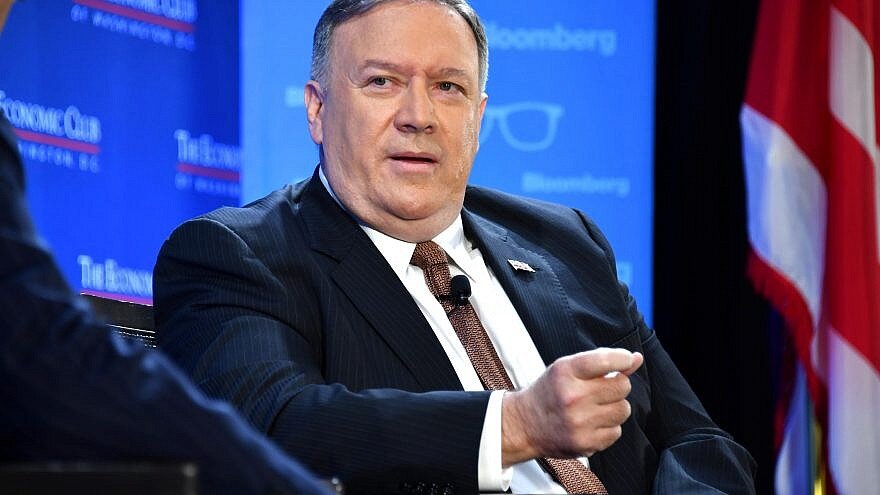TEHRAN — The U.S. has circulated a draft UN resolution that would indefinitely extend a UN arms embargo on Iran set to expire in October, U.S. officials and UN diplomats said on Tuesday.
The move will almost certainly spark opposition from Russia, which has made no secret of its desire to resume conventional weapons sales to Tehran, according to The Associated Press.
The draft document, which as of Tuesday had been circulated only to a small number of Security Council members, would strike the expiration of the arms embargo from the council resolution that endorsed the 2015 nuclear deal between six major powers and Iran, according to Trump administration officials and UN diplomats, who were not authorized to discuss the matter publicly and spoke on condition of anonymity.
The U.S. officials said the aim is to present the resolution for a vote in May when Estonia, a NATO member and close U.S. ally that is not party to the nuclear deal, holds the rotating presidency of the Security Council.
The officials said since Iran is admittedly no longer complying with several elements of the nuclear deal, according to the International Atomic Energy Agency, the Trump administration believes it has a case to make that the embargo should not be lifted.
Still, any attempt to extend the embargo will likely face stiff opposition from Russia and China, two veto-wielding permanent members of the Security Council who have argued it should be removed and want to resume arms sales to Iran.
Russia has been more outspoken on the matter and has derided U.S. attempts to bring the matter up for discussion, criticizing President Donald Trump for withdrawing the U.S. from the nuclear deal in 2018 and re-imposing tough American sanctions on Iran.
Despite that opposition, the U.S. officials said the administration is not planning at this point to raise the controversial matter of “snapback” – or restoring all UN sanctions against Iran that had been lifted or eased under the terms of the 2015 deal.
Although the administration pulled out from the deal two years ago, the U.S. maintains that it retains the right to invoke a sanctions snapback that the deal envisaged in the event of “significant non-performance” by Iran.
Kourosh Ahmadi, an international law expert, has said the United States’ legal argument that it remains an original “participant” under the terms of the Security Council resolution lacks any legal logic.
That position rests on a novel State Department legal argument that was first presented in December and asserts that although the U.S. is no longer in the nuclear deal, it remains an original “participant” under the terms of the Security Council resolution that enshrined it. That resolution does, in fact, list the parties to the 2015 agreement by name, but numerous diplomats have said the American argument is specious because the Trump administration has made such a point about no longer participating in the deal.
The U.S. risks sparking a diplomatic war and throwing the already damaged credibility of the Security Council into further jeopardy should it decide to invoke snapback because it is unlikely that either the Chinese or the Russians, and possibly other members, would go along with the re-imposition of UN sanctions or enforce them.
The Chinese, Russians, and many other council members have lamented the impact that the unilateral U.S. sanctions have had on Iran, crippling its oil exports and badly damaging its economy.
Kourosh Ahmadi, an international law expert, has said the United States’ legal argument that it remains an original “participant” under the terms of the Security Council resolution lacks any legal logic.
In an article published in the Etemad newspaper on Wednesday, Ahmadi said hardline senators such as Ted Cruz are pushing the Trump administration to take a tough stance in this regard.
“Their goal, which is approved and supported by hardline elements in Trump’s team, is to revive all anti-Iran UN Security Council resolutions by highlighting the dangers of lifting the arms embargo on Iran, and hence totally destroy the JCPOA,” he remarked.
“While their immediate goal is to prevent the lifting of the arms embargo on Iran, but given the U.S. presidential elections in November, they wish to minimize the possibility of a JCPOA revival in the event of Trump’s defeat,” he opined.
Failure of ‘maximum pressure’
Amid the heightened tensions between Tehran and Washington, Iran’s Islamic Revolutionary Guard Corps (IRGC) surprised the world last week with a successful launch of its first military satellite dubbed Nour (light) into the orbit.
“All parts of the satellite, including the carrier and satellite, have been produced by the Iranian scientists despite the U.S. sanctions,” IRGC Chief Major General Hossein Salami said.
Responding to the launch, U.S. Secretary of State Mike Pompeo said Tehran should be held accountable while citing UN Security Council Resolution 2231.
“Every nation has an obligation to go to the United Nations and evaluate whether this missile launch was consistent with that Security Council resolution,” he told journalists.
Iran rejected Pompeo’s accusation, saying Resolution 2231 does not ban it from launching satellites. Foreign Minister Mohammad Javad Zarif slammed the U.S. and Europe for misreading the resolution and reiterated Tehran’s missiles are not designed to carry nuclear weapons.
“US has been bullying all against UNSC Resolution 2231 since 2017,” Zarif tweeted on April 24. “Europe obeyed US instead of 2231.”
“Neither can lecture Iran based on flimsy misreadings of UNSCR 2231,” he said, adding, “Iran neither has nukes nor missiles “DESIGNED to be capable of carrying” such horrific arms. Guess who do?”
According to Seyed Hossein Mousavian, a former Iranian nuclear negotiator, “the recent satellite launch shows that despite all the sanctions and pressure, Iran’s missile capabilities have grown and it has almost reached the point of no-return.”
Mousavian, the Middle East security and nuclear policy specialist at Princeton University, told Al Jazeera that “Tehran's missile capability is the biggest concern for U.S. and Israel in case of a military attack against Iran.”
TAGS


No comments:
Post a Comment